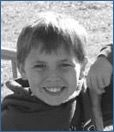 "It's given him a lot of confidence, and a sight reading ability that he didn't have before. If he gets into a groove now, well, he actually reads, and he's 150% better."
"It's given him a lot of confidence, and a sight reading ability that he didn't have before. If he gets into a groove now, well, he actually reads, and he's 150% better."
When D.J. Gold began using Fast ForWord in the third grade, the prospect of becoming a solid reader seemed remote at best. Not only did D.J. have to deal with his dyslexia, but his focus was further impeded by severe ADHD.
This double challenge created a frustrating cycle: the more D.J. struggled to decode the words on the page, the more his ADHD symptoms were triggered—which further impaired his concentration and made learning to read well all but impossible. As a result, D.J.'s reading scores were low and his behavior in the classroom was disruptive.
So when a Special Ed teacher told D.J.'s grandfather, Michael Gold, about Fast ForWord, he was very interested in giving it a try. For an entire year D.J. spent 50 minutes a day using the Fast ForWord intervention programs after his full days at Prairie Elementary School in Lafayette, Louisiana.
In the beginning, says Mr. Gold, there were many things that seemed more desirable competing for his grandson's attention. "It's like getting him to do anything else—he's just finished school, he's tired, and he'd like a little time to himself. He complains. But when he gets there, he locks in, and he really gets into the program. Yesterday, he was probably done in 40 minutes, and he was out of there."
Mr. Gold speaks unabashedly about the progress his grandson has made from consistently using Fast ForWord. "It's made a huge difference," he said. "It's given him a lot of confidence, and a sight reading ability that he didn't have before. If he gets into a groove now, well, he actually reads, and he's 150% better."
D.J.'s overall performance in the classroom has also improved significantly since logging his 5 day-a-week sessions. According to one of his teachers, D.J. can sit down, focus, and write just like any other kid when he wants to. His grades reflect his hard-won progress. During one nine-week segment of the second semester he was in the program, D.J. made honor roll.
D.J. must still work harder than other students, and he will be the first to tell you that he's still not very fond of reading. But he now has options available to him that didn't exist before Fast ForWord. "His attitude towards reading hasn't changed a whole lot," says his grandfather, "but the difference is he can do it. He doesn't struggle as much as he did before."
The difference in his self-esteem has also been noticeable. "He likes to show me what he's capable of, how many of the games he's completed, and he likes to show me his scores. So there's a tremendous amount of pride and sense of accomplishment in what he's doing."
D.J. himself is clearly happy about his gains. "Fast ForWord has helped me to focus and concentrate in school," he says. "My lessons seem easier, because I can read better. In the beginning, it was hard, but now I like it. It's fun to do the exercises!"



